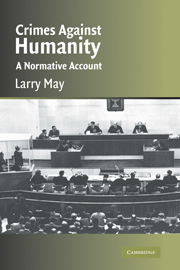2 - Jus Cogens Norms
Published online by Cambridge University Press: 23 November 2009
Summary
When an international tribunal is set up to address mass murder or ethnic cleansing perpetrated by members of a State against fellow members of the same State, a relatively new form of international law is put on the table. This is the most controversial forum for international law. It is the most controversial because it implies that there are international normative standards that govern how States act within their own borders and toward their own subjects. Such standards imply that there are norms that hold true for all States, perhaps at all times. If the standards in international law are merely what States agree about, then all a State has to do to get its own genocidal practices taken out of the international law domain is to declare that this State does not agree to be bound to a normative standard that proscribes genocide, in a similar way that a rapist could avoid prosecution simply by denying the jurisdiction of the court. International prosecutions often occur on the basis of what is called “universal jurisdiction” – that is, on the basis of norms that hold for all States regardless of where they or their subjects act, yet it is often unclear what the basis of this universal jurisdiction is.
In this chapter, I argue that there are some principles that transcend national borders and achieve universal binding force. In international law, some crimes so clearly harm the international community that they must be proscribed in all societies.
- Type
- Chapter
- Information
- Crimes against HumanityA Normative Account, pp. 24 - 39Publisher: Cambridge University PressPrint publication year: 2004

